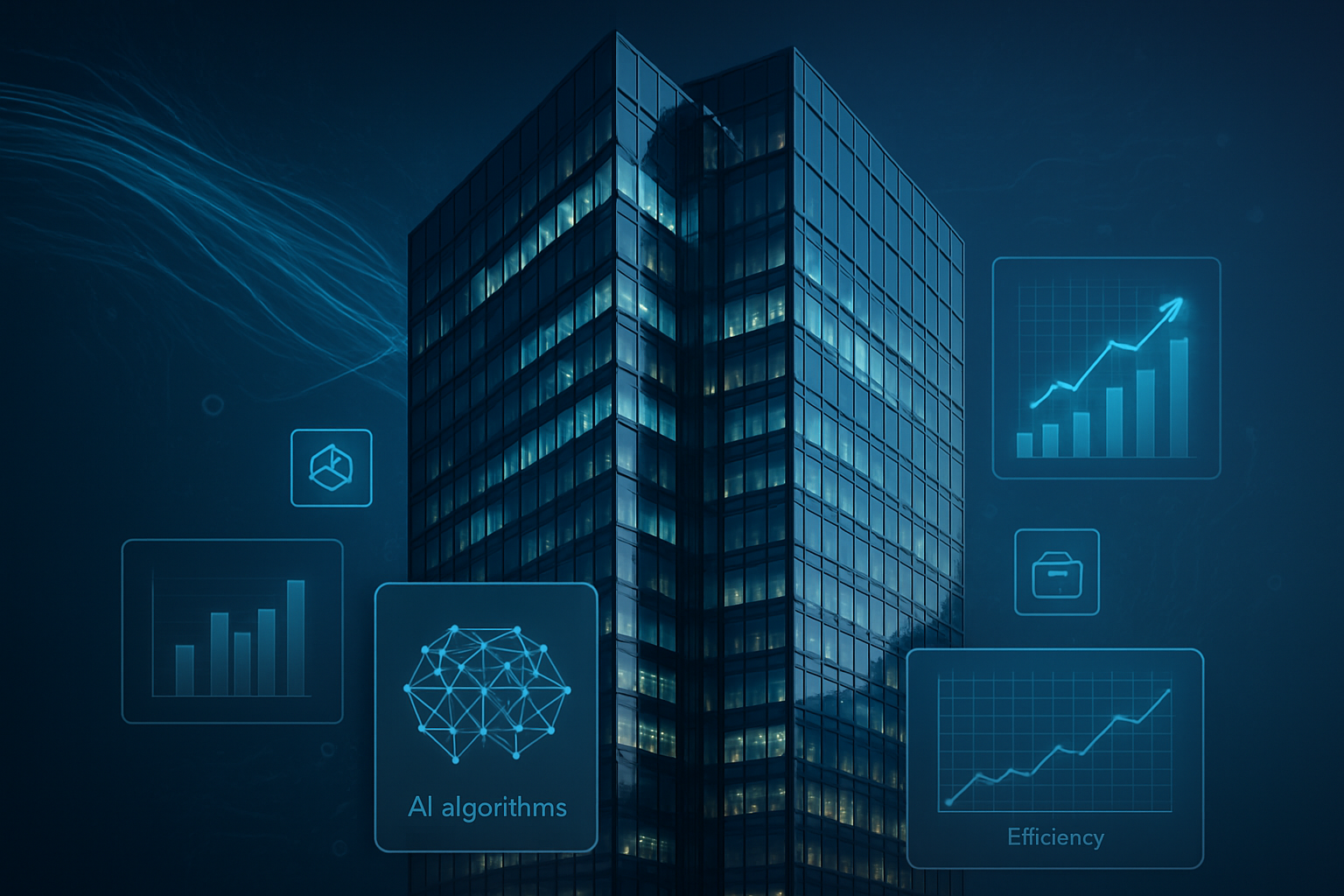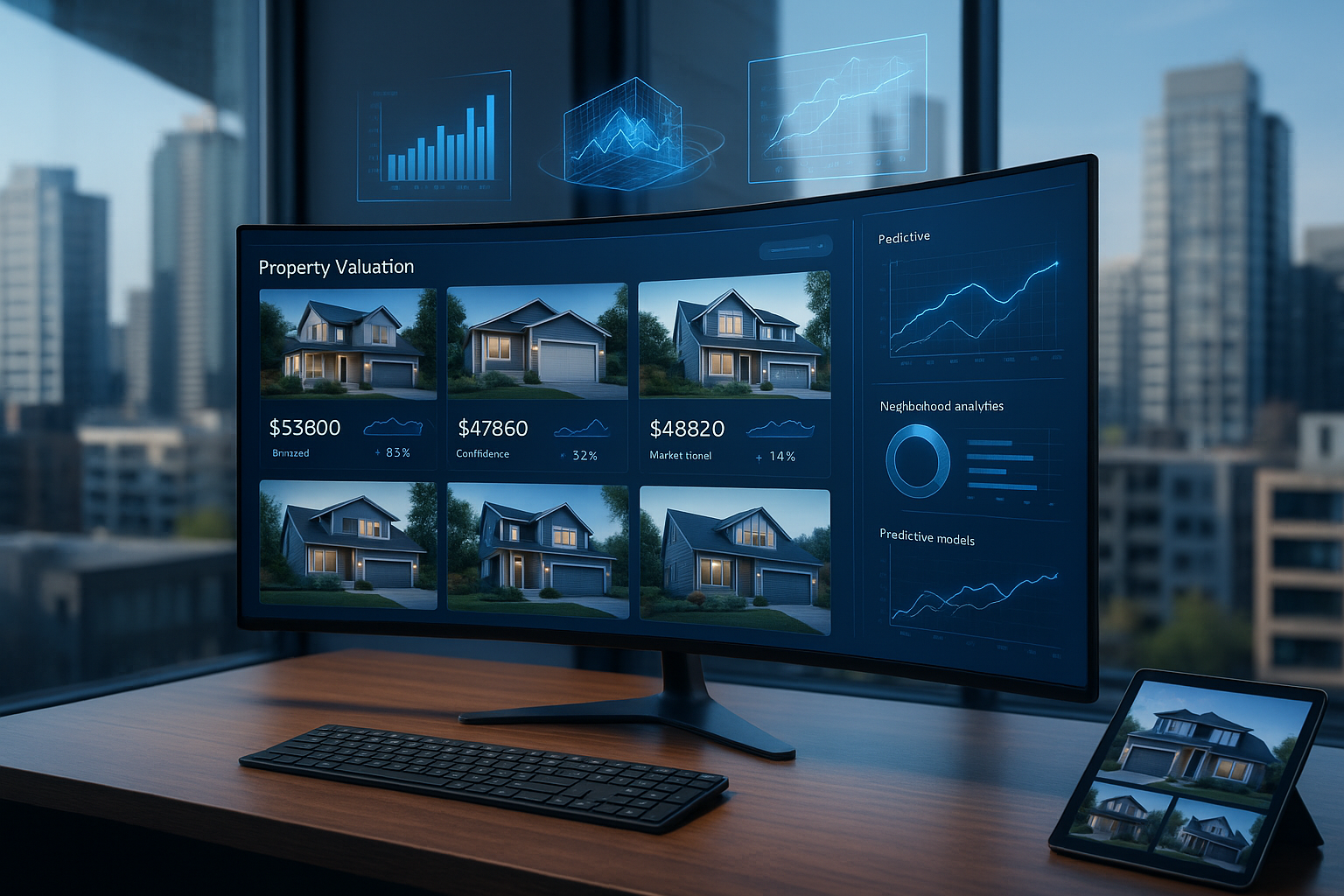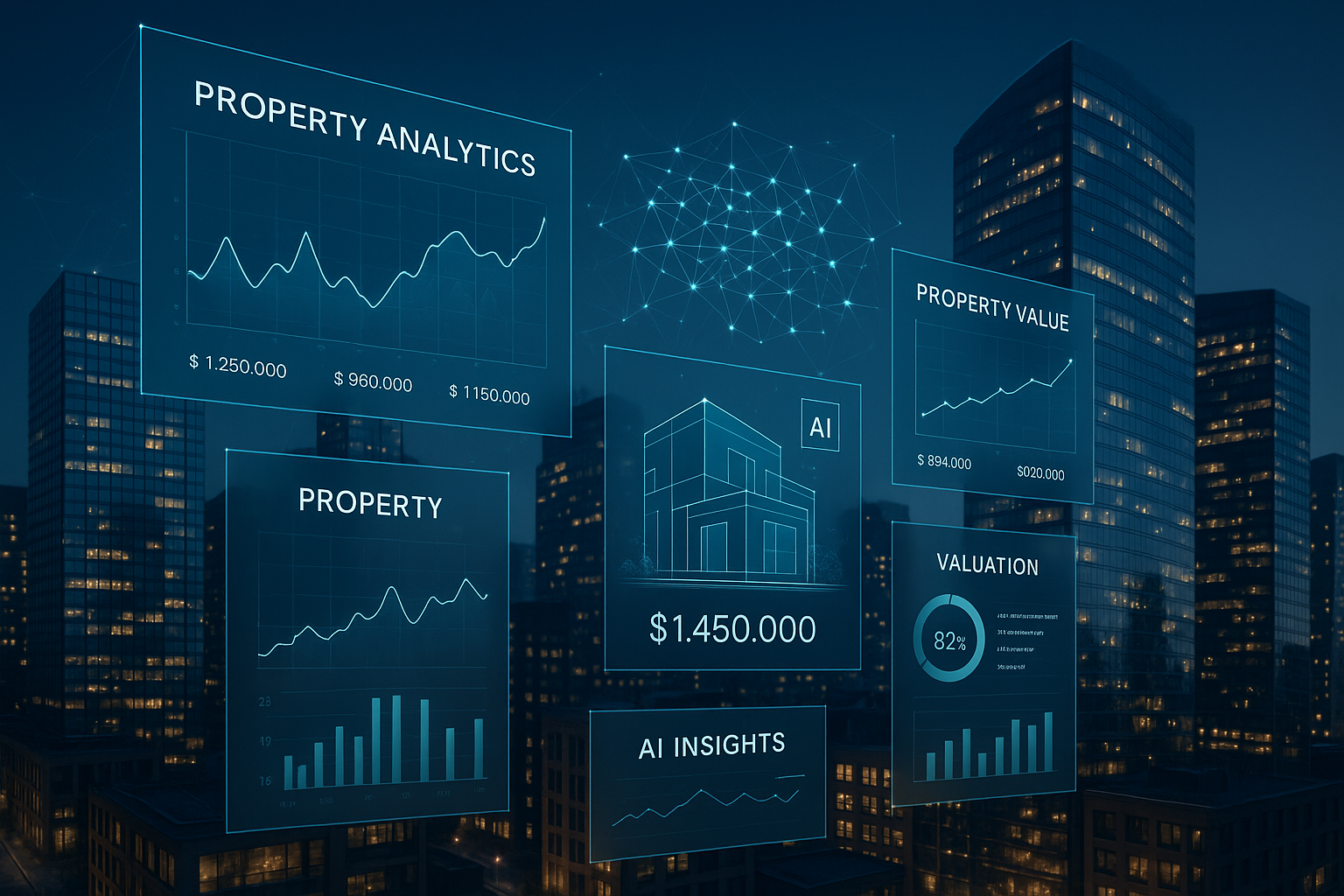
AI Real Estate Revolution: How PropTech is Unlocking $34B in Efficiency Gains by 2030
Caiyman.ai Research Team
AI Solutions Architect
The commercial real estate industry stands at the precipice of its most significant transformation in decades. According to groundbreaking research from Morgan Stanley, artificial intelligence could unlock $34 billion in efficiency gains across the real estate sector by 2030, with an astounding 37% of industry tasks now capable of automation. This isn't just incremental improvement—it's a fundamental reshaping of how we buy, sell, manage, and invest in real estate.
The numbers tell a compelling story. Morgan Stanley's analysis of 162 real estate investment trusts (REITs) and commercial real estate firms, representing $92 billion in combined labor costs and 525,000 employees, reveals that AI adoption has moved from experimental to essential. From digital receptionists managing tenant inquiries to sophisticated machine learning models optimizing multi-billion-dollar portfolios, AI is no longer a future possibility—it's today's competitive imperative.
What makes 2025 particularly significant is the convergence of mature AI technologies, robust PropTech investment, and urgent market pressures for operational efficiency. As Caiyman's strategic analysis reveals, institutional players who embrace AI-powered solutions today are positioning themselves to capture outsized returns while those who delay risk being left behind in an increasingly digital marketplace.
The PropTech Market Explosion: By the Numbers
The PropTech revolution is backed by unprecedented investment and growth metrics that underscore its transformative potential. The global PropTech market reached $40 billion in 2024 and is projected to grow at a 16% compound annual growth rate through 2034, making it one of the fastest-growing technology sectors.
Perhaps more striking is the AI adoption rate within PropTech. JLL Research indicates that among 7,000 global PropTech companies, approximately 700 (10%) are currently providing AI-powered solutions, including both AI-native products and AI-augmented platforms. This represents a significant shift from just two years ago when AI integration was limited to a handful of early adopters.
The funding landscape reveals strong investor confidence in AI-driven real estate solutions. Approximately 62% of AI-powered PropTech companies are venture capital-backed, with about 20% in early-stage incubation and 25% advancing to growth stages. The commercial real estate segment is expected to dominate the market with a 56% market share in 2025, driven by the sector's scale, complexity, and demand for sophisticated automation solutions.
Looking ahead, the AI in real estate market is projected to reach an astounding $975.24 billion globally by 2029, indicating that current adoption levels represent just the beginning of a much larger transformation. This growth trajectory is being fueled by institutional recognition that AI delivers measurable operational improvements and competitive advantages that directly impact bottom-line performance.
Core AI Applications Transforming Real Estate Operations
The practical applications of AI in commercial real estate span the entire value chain, from initial property acquisition through ongoing management and eventual disposition. Understanding these core applications is essential for executives planning their technology roadmaps.
Institutional Portfolio Management and Risk Assessment
At the institutional level, AI is revolutionizing how large-scale portfolios are managed and optimized. BlackRock's Aladdin platform exemplifies this trend, serving as an AI-powered "portfolio co-pilot" that augments human decision-making in asset allocation, rebalancing, and stress-testing commercial real estate portfolios.
Multi-agent deep reinforcement learning systems are particularly effective for dynamic portfolio rebalancing, as they can adapt to the unique characteristics of commercial real estate—illiquidity, spatial dynamics, and non-linear asset correlations. These systems continuously monitor market conditions, property-level performance, and macroeconomic indicators to recommend tactical reallocations that optimize risk-adjusted returns.
Real-time ESG (Environmental, Social, and Governance) data collection and compliance reporting have become automated through AI platforms. Companies like Blooma.ai and Clarity AI provide scalable solutions for sustainability reporting, which is increasingly critical as regulatory requirements expand and investors prioritize ESG performance metrics.
Property Management and Operational Efficiency
Operational efficiency gains represent the most immediate and measurable impact of AI adoption. Automated vendor bidding and work order routing systems now use AI to triage maintenance requests, generate instant quotes, and score vendor reliability—reducing response times and improving cost management across large portfolios.
Smart building technology integration with IoT sensors and AI analytics is delivering impressive results. Buildings equipped with smart management systems have demonstrated energy savings of up to 30%, while predictive maintenance algorithms reduce operational costs and improve tenant satisfaction by preventing equipment failures before they occur.
Automated lease abstraction and regulatory document parsing represent another high-impact application area. Natural language processing algorithms can extract key terms from complex lease agreements, automate compliance checks, and flag potential issues—particularly valuable as new ESG disclosure requirements create additional documentation burdens.
PropTech Innovation Spotlight: Leading AI Solutions
The PropTech ecosystem features numerous companies delivering measurable results through innovative AI applications. These case studies illustrate the practical impact and ROI potential of AI implementation.
HappyCo has emerged as a leader in AI-powered property inspections, with their platform reducing move-out disputes by 20% for major operators like Greystar by providing objective documentation of property conditions. Their automated photo and video capture system, combined with AI labeling and embedded time and location data, has standardized what was previously a highly manual and subjective process.
DroneDeploy advances exterior property inspections through AI analysis of drone imagery. Their system can detect roof, facade, and landscape damage after storms or tenant changes, classify severity levels, and auto-generate actionable work orders. One property management company saved $45,000 in potential water damage through early roof damage detection via DroneDeploy's AI analysis.
Uniti AI represents the new generation of "AI-first" PropTech startups. After raising $4 million in seed funding, they've deployed customizable AI agents for commercial real estate operators that automate lead engagement, appointment scheduling, collections, and tenant support. Their clients report doubled lead-to-rent conversions and a 50% reduction in manual CRM work.
The scale of potential ROI is exemplified by Royal London Asset Management, which achieved 708% ROI and 59% energy savings through implementation of JLL's Hank AI for building management. Meanwhile, Growthpoint reduced financial reporting time from weeks to hours using AI-centric MRI PropTech tools—demonstrating how AI can transform both operational efficiency and strategic decision-making capabilities.
TurboTenant showcases AI's potential in property management automation, using machine learning for tenant screening, rent collection, and maintenance management, while providing landlords with tools to compare applicant income against TransUnion data for more accurate risk assessment.
Strategic Implementation: Best Practices for AI Adoption
Successful AI implementation in commercial real estate requires a structured approach that balances technological ambition with practical execution. Industry leaders are following proven methodologies to maximize ROI while minimizing implementation risks.
Phased Deployment Strategy has proven most effective, starting with operational efficiencies like predictive maintenance and automated reporting before advancing to strategic applications such as portfolio optimization and autonomous property management. This approach allows organizations to build AI literacy and demonstrate value before making larger investments in transformative technologies.
Data Governance and Quality Foundations are absolutely critical, as robust AI is only as effective as its underlying data. Caiyman's research emphasizes the importance of addressing data silos, standardizing formats, and centralizing information before deploying AI solutions. Organizations that skip this foundation often encounter accuracy and reliability issues that undermine AI effectiveness.
Human-AI Collaboration Models maximize both efficiency and expertise by leveraging AI for data processing and pattern recognition while preserving human judgment for strategic decisions. Leading institutional players like BlackRock, JLL, and CoreLogic deploy AI as "portfolio co-pilots" rather than replacement systems, ensuring that technology augments rather than replaces human expertise.
Integration with Existing PropTech Platforms through open APIs is essential for seamless workflow implementation. Priority should be given to solutions that integrate well with established platforms like Yardi, MRI, ARGUS, and Cherre, as this connectivity enables end-to-end automation and reduces the learning curve for staff adoption.
Organizations must also develop robust ROI measurement frameworks and performance benchmarking systems to track AI impact. This includes establishing baseline metrics before implementation and monitoring key performance indicators such as processing time reduction, accuracy improvements, cost savings, and revenue enhancements.
Navigating Regulatory Compliance and Ethical AI
As AI adoption accelerates, regulatory compliance and ethical considerations have become critical success factors. The regulatory landscape is evolving rapidly, and organizations must proactively address these requirements to avoid legal and reputational risks.
The EU AI Act represents the most comprehensive AI regulation to date, requiring transparency, human oversight, robustness checks, and formal governance frameworks for high-risk AI systems including tenant screening and capital allocation algorithms. Organizations operating in or with EU entities must prepare for "high-risk" system documentation requirements and explainability mandates.
Fair Housing Act compliance in the United States mandates bias audits, explainability, and non-discrimination measures for AI-powered tenant screening and lending decisions. Recent enforcement actions by HUD and the Department of Justice have demonstrated that algorithmic bias in housing decisions will face serious legal consequences.
GDPR and CCPA privacy requirements demand privacy-by-design approaches with data minimization, comprehensive audit trails, and user opt-out capabilities. Real estate organizations must ensure that AI systems collecting and processing personal data comply with these stringent privacy standards.
Explainable AI (XAI) has become essential for regulated use cases. Organizations should prioritize AI solutions that provide clear reasoning for their decisions, particularly for applications involving tenant screening, property valuation, and investment recommendations. This transparency is not only regulatory compliance but also builds trust with stakeholders and enables better decision-making.
Best practices include conducting regular AI model audits for both performance and fairness, implementing comprehensive AI governance frameworks aligned with industry standards, and investing in AI literacy programs for compliance and investment teams to understand both capabilities and regulatory boundaries of AI solutions.
The Future of AI-Powered Real Estate: 2025 and Beyond
The trajectory of AI in real estate points toward even more sophisticated applications and deeper integration across all aspects of the industry. Several emerging trends will shape the next phase of transformation.
Generative AI for Marketing and Communications is rapidly expanding beyond basic content creation to include sophisticated investor reports, personalized property marketing materials, and dynamic design renderings that can be customized in real-time based on client preferences and market conditions.
Multi-Agent Systems are becoming standard for complex workflow orchestration, enabling automated due diligence processes where different AI agents review leases, financials, and environmental documents in parallel while escalating issues contextually to human experts. This approach dramatically reduces transaction timelines while improving accuracy and thoroughness.
Climate Risk Assessment and ESG Reporting are evolving into competitive differentiators as AI systems integrate real-time environmental data, regulatory changes, and sustainability metrics to provide comprehensive risk assessments and automated compliance reporting. Organizations that excel in this area will attract capital from increasingly ESG-focused investors.
The shift toward "AI-First" Real Estate Companies is accelerating, with new market entrants building their entire technology stack around AI capabilities rather than retrofitting existing systems. These companies are demonstrating superior operational efficiency and scalability, forcing traditional players to accelerate their own digital transformation efforts.
Key success factors for staying competitive include maintaining robust data governance, developing AI literacy across all organizational levels, implementing explainable AI systems for regulatory compliance, and building strategic partnerships with leading PropTech providers to access cutting-edge capabilities without massive internal development investments.
Transform Your Real Estate Operations with AI
The evidence is clear: AI is not just transforming real estate—it's creating a new competitive landscape where early adopters gain significant advantages in efficiency, accuracy, and profitability. With Morgan Stanley projecting $34 billion in efficiency gains by 2030, the question isn't whether to adopt AI, but how quickly and effectively you can implement these transformative technologies.
At Caiyman.ai, we specialize in custom AI solutions specifically designed for commercial real estate professionals. Our expertise spans regulatory compliance, portfolio optimization, and PropTech integration—enabling us to accelerate your AI transformation journey while ensuring robust governance and measurable ROI. Whether you're looking to automate property management workflows, enhance investment decision-making, or prepare for evolving regulatory requirements, our team can help you navigate the complex landscape of AI implementation in real estate.
Don't let your organization fall behind in this rapidly evolving market. Contact Caiyman.ai today to discuss how our specialized AI consulting services can unlock efficiency gains and competitive advantages for your real estate operations.
Sources
- Morgan Stanley Research: How AI Is Reshaping Real Estate
- Caiyman Strategic Analysis: Navigating the Algorithmic Frontier in Institutional CRE
- JLL Research: Artificial Intelligence and Its Implications for Real Estate
- Ascendix Technologies: Top 35 PropTech Companies and Startups in the USA in 2025
- Showdigs: Top 7 AI in Property Management Trends for 2025
- Stanford HAI 2025 AI Index Report
- SoftKraft: What is PropTech? 2025 Guide
- Coherent Market Insights: PropTech Market Size, Share and Opportunities, 2025-2032
- Data-Hat AI: AI in Real Estate - Unlocking a Billion-Dollar Opportunity
- PR Newswire: Uniti AI Secures $4M Seed Round
- Blooma AI: ESG in Commercial Real Estate
- CBRE: How AI Is Advancing Decision-Making in Corporate Real Estate
Share this article
Related Articles

How AI Is Transforming Property Valuation: 2025 AVM Market Analysis and Predictions
The AI revolution in real estate is accelerating with automated valuation models reaching 99% accuracy and a market projected to hit $303.06 billion in 2025.

Domain-Specific LLMs in Real Estate: How Real-GPT and AI Are Transforming Property Valuation
Discover how purpose-built LLMs like Real-GPT are revolutionizing property valuation, investment analysis, and compliance in real estate through explainable AI and advanced automation.

Multi-Agent AI Systems Transform CRE: From Due Diligence to Portfolio Management in 2025
Commercial real estate leaders are deploying multi-agent AI systems to orchestrate complex workflows from property due diligence to ESG compliance, achieving 700%+ ROI and transforming institutional operations.